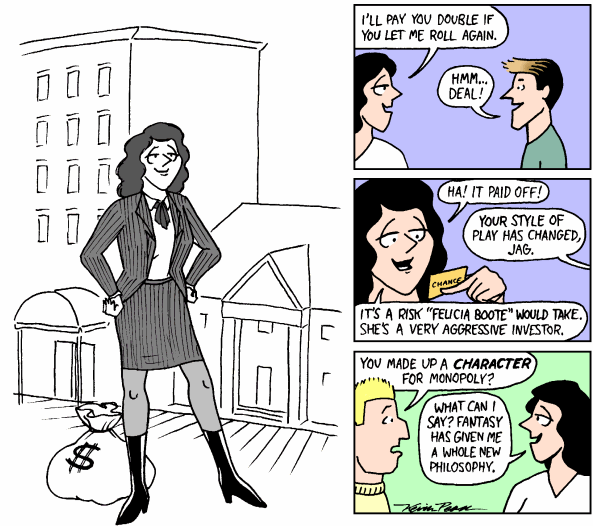Betrayal at House on the Hill, and Knowing It When You See It
Betrayal at House on the Hill is an RPG.
No, it isn’t.
I mean, it is, kinda, but it very much isn’t. Betrayal is a lovely little game where you create your own 80s horror flick, complete with traitor, campy villain, and spooky house. If you go looking to buy Betrayal you’ll find it on the shelf next to all the other board games, not an RPG to be seen.
Besides, it doesn’t have most of those RPG traits we mentioned at the beginning of this whole project. Granted, it does have dice, yes, and pre-built character sheets with stats. It has combat mechanics and items/inventory.
But it has no GM. It has a board, of sorts, built by the players as they move through the house. The game-narrative is weakly integrated, only showing up halfway through each game, to provide the “twist” about what is really going on. Then, a single player becomes “the baddie,” and it stops being cooperative. The story doesn’t show up again until the resolution, whether the goodies or the baddies win. And perhaps most fundamentally, the players aren’t roleplaying.
Are they?
Here’s the thing. I’d ordinarily agree that Betrayal isn’t an RPG. I still have trouble thinking of it as an RPG. But I will never forget that night.
My father, playing the German scientist character, had to run across the entire board to help save the teen and the tween from the giant spider. We were barely able to survive long enough for him to get to us with his spear, and we managed to win thanks to his help. I don’t remember the die rolls, I don’t remember the play-by-play, I don’t remember anything about that evening except for my father, moving his miniature across the board, shouting in a thick German accent, “I’m coming, girls!”
My father had never played an RPG in his life…but the more I think about it…hasn’t he?
RPGs don’t need GMs, we’ve seen that. They can have pre-built characters. They can use battle-maps, which are not that different than a board. A weak game-narrative is still a narrative, and there are countless systems that ape movie genres, from 70s sci-fi to 80s horror schlock.
What about Gloomhaven? Recently, (at time of writing) word has come out about the Gloomhaven RPG — but isn’t Gloomhaven already an RPG?
No, it’s a board game. Inspired by RPGs, certainly, but not an RPG. It doesn’t have a GM, is exclusively about strategic combat, has an exhaustion mechanic, and uses cards instead of dice.
But again, there are lots of RPGs that have no GMs and use cards instead of dice. Exhaustion mechanics are tangentally related to short resting in D&D, or catching your breath in Breathless games. Strategic combat was tried in 4th edition D&D and it was still an RPG, wasn’t it? Enough so that strategic combat is a major part of many RPGs.
As I think about it, the only thing that is really not RPG-like about Gloomhaven is how it handles “events”; drawing two cards and answering multiple choice questions isn’t a particularly RPG-like way of dealing with non-combat, but it solves the problem of how to have non-combat encounters without a GM.
Does that mean the way to turn Gloomhaven into an RPG is to tell the players “this board game is really an RPG. Go ahead and roleplay?” Is the ultimate definition of an RPG merely claiming the title? Is that all that is keeping Betrayal from being a horror RPG?
I’ve seen enough forum posts, I know that there are people out there who will bristle at that idea, same as there are people who bristle at the flexibility of gender. “If I can just say my game is an RPG, what’s to stop someone from calling Monopoly an RPG?”
Well…nothing. More to the point, there is nothing to stop someone playing Monopoly as an RPG.

When looked at through that lens, we can take one more step: what will person playing Monopoly as an RPG do differently?
Well, they might — to put it clumsily — play the game “poorly.” Monopoly has clear rules and no real strategy; luck is far more of an influential aspect. If you roleplay, on the other hand, you are adding another purpose to the game beyond winning. You might sacrifice a “winning move” in favor of one that is “good roleplaying.”
I talked about this before when discussing both what it meant to play a role correctly and player/character synchronization. We see it all the time in roleplaying: The cowardly wizard who runs off instead of helping their allies, the greedy thief whom other peoples’ property comes naturally to, the raging warrior who kills the bandits instead of interrogating them — these are all actions that subsume the more traditional goal of “winning.”
If this strategic self-sabotage is in any way integral to roleplay, does this mean that the wargame aspects of RPGs are, in fact, distractions? Is coming up with powerful builds or effective strategies bad roleplaying?
That’s not for me to answer, but I do think it’s interesting that we can ask the question about games that are not strictly roleplaying games.
This makes roleplay not a specific kind of game, but a specific kind of play. An RPG might not be a cluster of adjectives describing a ruleset, but rather a cluster of active verbs. RPG doesn’t fit alongside “board game,” “horror movie,” or “Chinese food;” but rather “cooking,” “camping,” and “playing ball.”
We generally think of different artistic mediums as material things: sculpture, paintings, film, or books. I wonder if its more important, if not more interesting, to look at mediums through their techniques: sculpting, painting, filming, or writing.
It’s an interesting idea, at least, and worthy of someone smarter than me to explore.
Perhaps that someone is you? Could be! Think about it, won’t you?